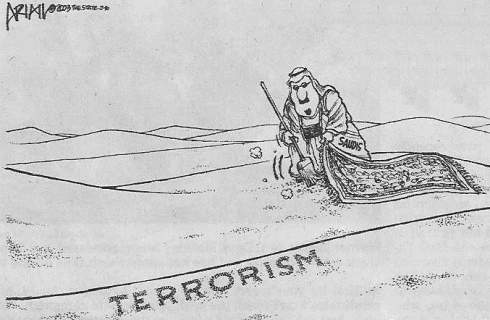|
Saudis learn lessons of terror and hatred in schools
BY JOEL SPRAYREGEN
There is no chance of eliminating terrorism by Saudis unless Saudi Arabia uproots its educational establishment. That establishment continues to teach hatred of Westerners. This incitement is rooted in history. Dore Gold's new book, Hatred's Kingdom, utilizing previously unpublished documents, unmasks Saudi reality. The Saudi government has ceded control of religion and education to the fanatic Wahhabi sect. In return, the Wahhabis confer political legitimacy.
Wahhabiism is a maverick Islamic creed of relatively recent origin. Ibn Abdul Wahhab, an 18th century preacher, condemned his opponents, including Muslims, as polytheists and advocated murder ("Kill those who ascribe partners to God, wheresoever you find them.").
Wahhab struck a bargain with the first Saudi king under which, Gold writes, the rulers "would protect Ibn Abdul Wahhab and spread his new creed, if he would legitimize Saudi rule over an expanding circle of Bedouin tribes, which were subdued through jihad."
In conquering one Arab city, Saudis "killed every woman, man and child they saw, cutting even the babies in cradles."
King Ibn Saud (1880-1953) concentrated on exploiting oil. Subsequent kings have been his sons. In the 1950s, Arab nationalists sought to undermine the kingdom.
King Faisal utilized Islam as a counterweight. By 1974, his Muslim World League had a budget of $50 million for Wahhabi indoctrination. Inside the kingdom, the Wahhabi educational establishment increased exponentially. In 1965, the kingdom had 3,625 university students. By 1986, the number reached 113,529. All are educated in Wahhabi hatred.
Fanatics from Arab republics found refuge in Saudi Arabia and became missionaries. Secular education was denounced as "aggression against Islamic legitimacy."
Abdullah Azzam, a Palestinian, was sent to Pakistan, where he recruited Arabs with Saudi money, much of it from princes, to fight in Afghanistan. Azzam preached mass murder, "and the Jihad will remain an individual obligation until all of the lands which were formerly Muslim come back to us and Islam will reign within them once again." When Azzam was killed by a Russian bomb in 1989, he was succeeded by his student, Osama bin Laden, who converted his organization into al-Qaida.
Bin Laden's followers murdered Americans in the 1990s. The Saudis denounced these attacks, but thwarted investigations and beheaded suspects before the FBI could interrogate them. Funding of fanatics by Saudi businessmen and royals continued. Gold shows that such funds were utilized by the 9/11 terrorists.
| |
